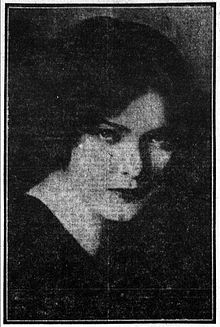Viola Barry
This article includes a list of general references, but it lacks sufficient corresponding inline citations. (July 2008) |
Viola Barry | |
|---|---|
 | |
| Born | Gladys Viola Wilson 1889 or 1890 Evanston, Illinois, U.S. |
| Died | April 2, 1964 Los Angeles, California, U.S. |
| Occupation | Film actress |
| Years active | 1911–1920 |
| Spouse(s) | John Conway (1911–1918) F. McGrew Willis (1921–1957) |
Viola Barry (1889 or 1890[1] – April 2, 1964) was an American silent film actress who starred in a number of films during the 1910s.
Early years
Gladys Viola Wilson was born in Evanston, Illinois, the daughter of Rev. J. Stitt Wilson, a Methodist minister.[2] She moved with her family to Berkeley, California, where her father was a socialist lecturer and was mayor of Berkeley in 1911.[citation needed] She attended Berkeley High School.[3]
She studied under Herbert Beerbohm Tree while she spent more than two years in England, returning to California in December 1909.[1]
Acting career
Before December 1909, Barry was leading woman at Ye Liberty Theater in Oakland, California.[1] In 1910, under her stage name Viola Barry,[4] Wilson signed with the Belasco Theater Company in Los Angeles to be its new ingénue. Previously, she had four years of stage experience, two of these with F. H. Benson's Shakespearean Company in England. Among the heroines she played were Desdemona, Juliet, Ophelia, and Portia.[5] Her first appearance with the Belasco company was in The Test by Jules Eckert Goodman.[6]
She was in movies from 1911 through 1920. Her early screen credits include The Totem Mask, The Voyager: A Tale of Old Canada, McKee Rankin's '49, John Oakhurst, Gambler, An Indian Vestal, Coals of Fire, A Painter's Idyl, The Chief's Daughter, George Warrington's Escape, and Evangeline. All these were completed in her first year in movies.
Personal life
In February 1911, Barry married actor and film director Jack Conway of the Bison Moving Picture Company[7] in Santa Ana, California. They had one daughter, Rosemary. The couple divorced in 1918. Barry later married screenwriter Frank McGrew Willis, with whom she had four children: Virginia, Gloria, McGrew, and James.
Barry was a suffragette and, like her father, a Socialist.[5]
Death and legacy
Barry died in 1964 in Hollywood, California. She was buried at the Mountain View Cemetery in Oakland, California.[citation needed]
Selected filmography
- Help! Help! Hydrophobia! (1913)
- The Mothering Heart (1913)
- The Ranchero's Revenge (1913)
- The Lady and the Mouse (1913)
- A Misunderstood Boy (1913)
- A Frightful Blunder (1913)
- Peeping Pete (1913)
- The Little Tease (1913)
- Almost a Wild Man (1913)
- Twixt Love and Fire (1914)
- His Favourite Pastime (1914)
- John Barleycorn (1914), lost film
- Martin Eden (1914), incomplete film
- The Flying Torpedo (1916), lost film
Footnotes
- ^ a b c "Young girl wins honors abroad". The San Francisco Call. December 8, 1908. p. 9wpn. Retrieved June 3, 2021.
- ^ "Returned Lecturer, J. Stitt Wilson, to Speak at Berkeley," Oakland Tribune, Feb 13, 1910, pg. 30.
- ^ "Minister's girl proves a clever play writer". Oakland Tribune. August 5, 1906. p. 13. Retrieved June 3, 2021 – via Newspapers.com.
- ^ Although she used it for the rest of her life, Viola Barry was actually a stage name. See: "Actress, Daughter of Well Known Socialist, Marries," Oakland Tribune, Feb. 28, 1911, pg. 11.
- ^ a b "Actress Viola Barry a Socialist? Sure! Stitt Wilson's her father". Los Angeles Herald. December 6, 1910. p. 4wpn. Retrieved June 3, 2021.
- ^ "Viola Barry at Belasco". The Los Angeles Times. November 24, 1910. p. 16. Retrieved June 3, 2021 – via Newspapers.com.
- ^ "Viola Barry, former Liberty favorite, weds motion picture man". The Evening Times-Star. California, Alameda. February 28, 1911. p. 8. Retrieved June 3, 2021 – via Newspapers.com.
Other sources consulted
- Los Angeles Times, "Viola Barry at Belasco", November 24, 1910, Page II6.
- Los Angeles Times, "No Failure for Them", February 27, 1911, Page II3.
- Los Angeles Times, "Rites Held for Star of Silent Films", April 7, 1964, Page 32.
External links
- Viola Barry at IMDb
- Viola Barry at AllMovie
- Viola Barry at the TCM Movie Database
